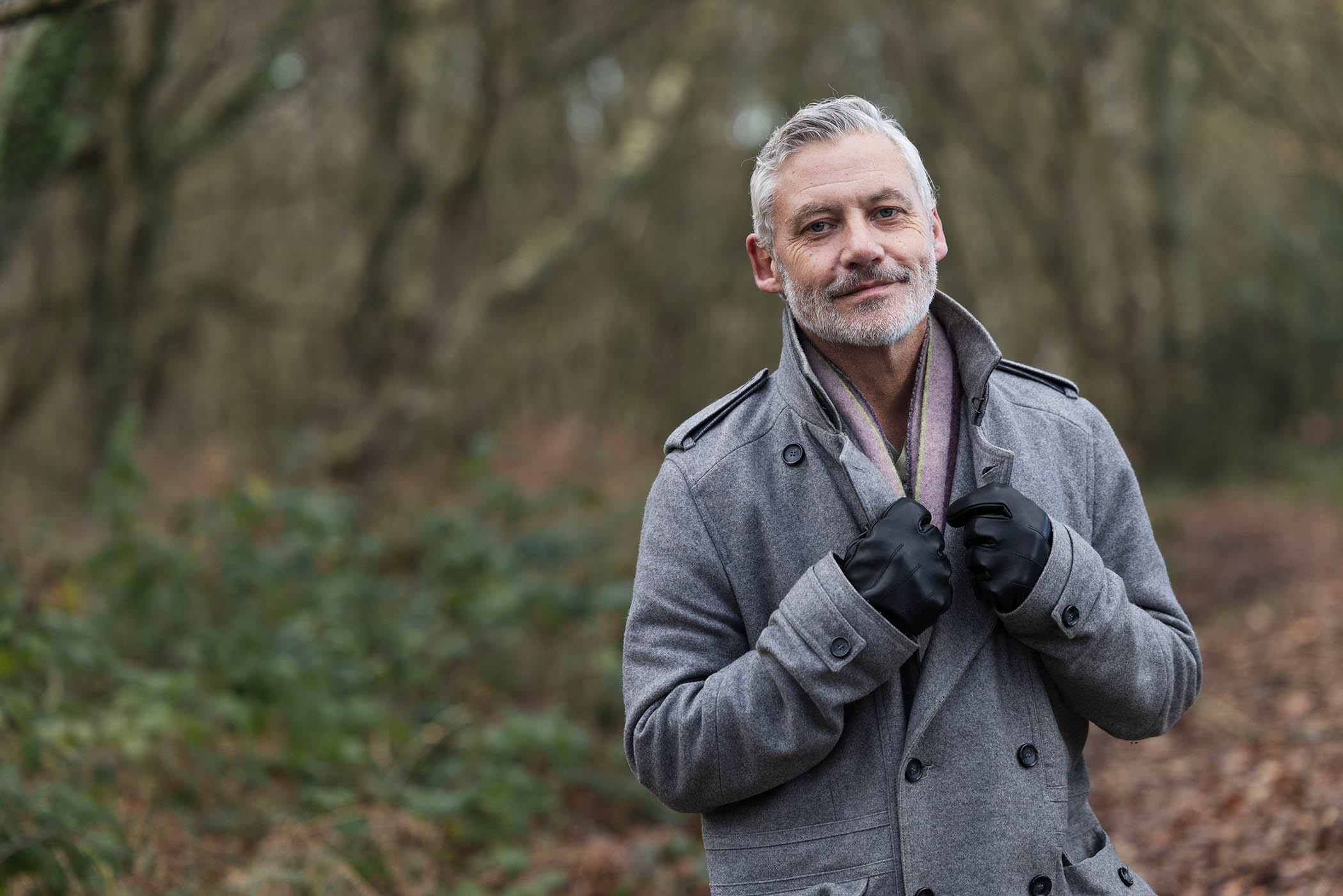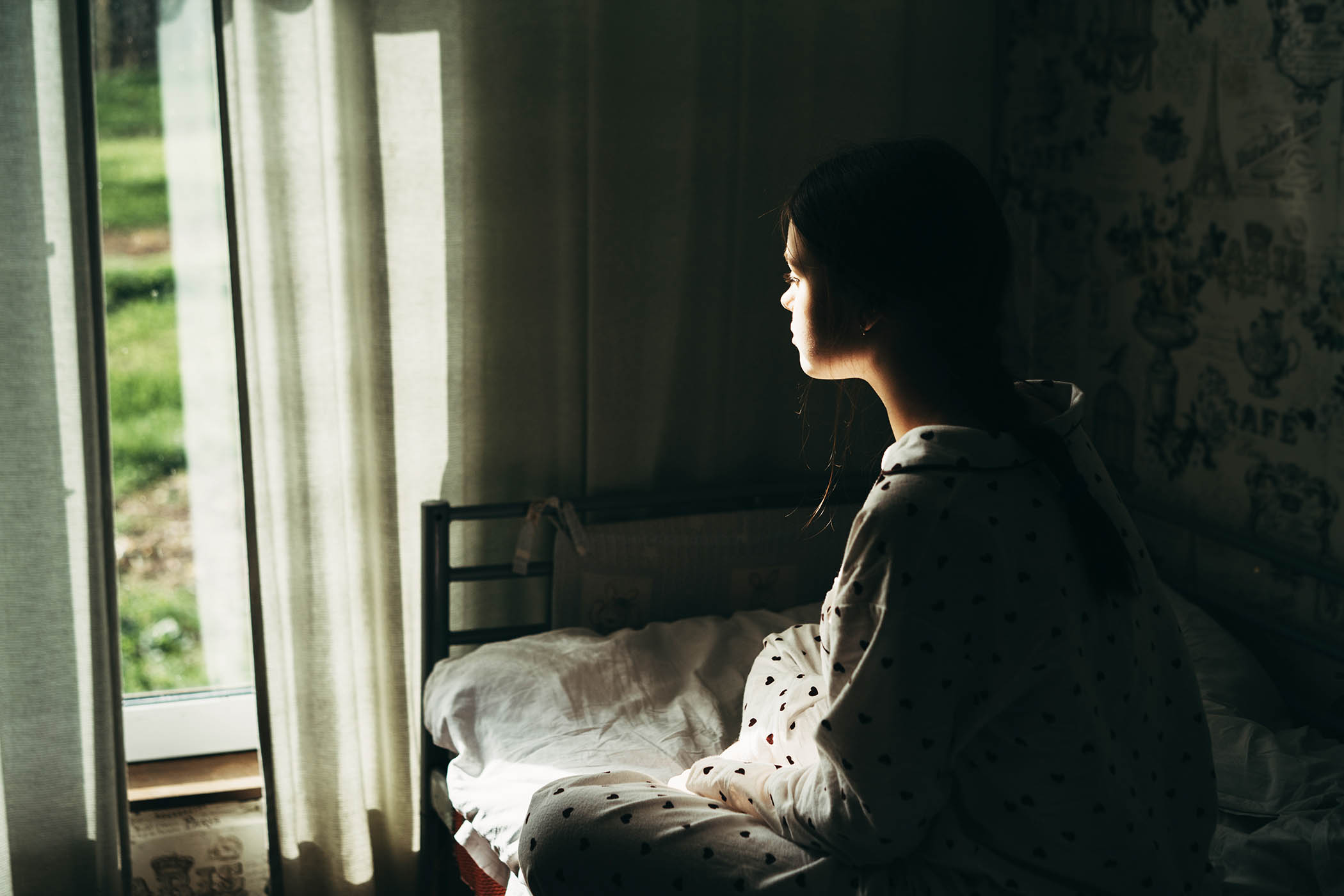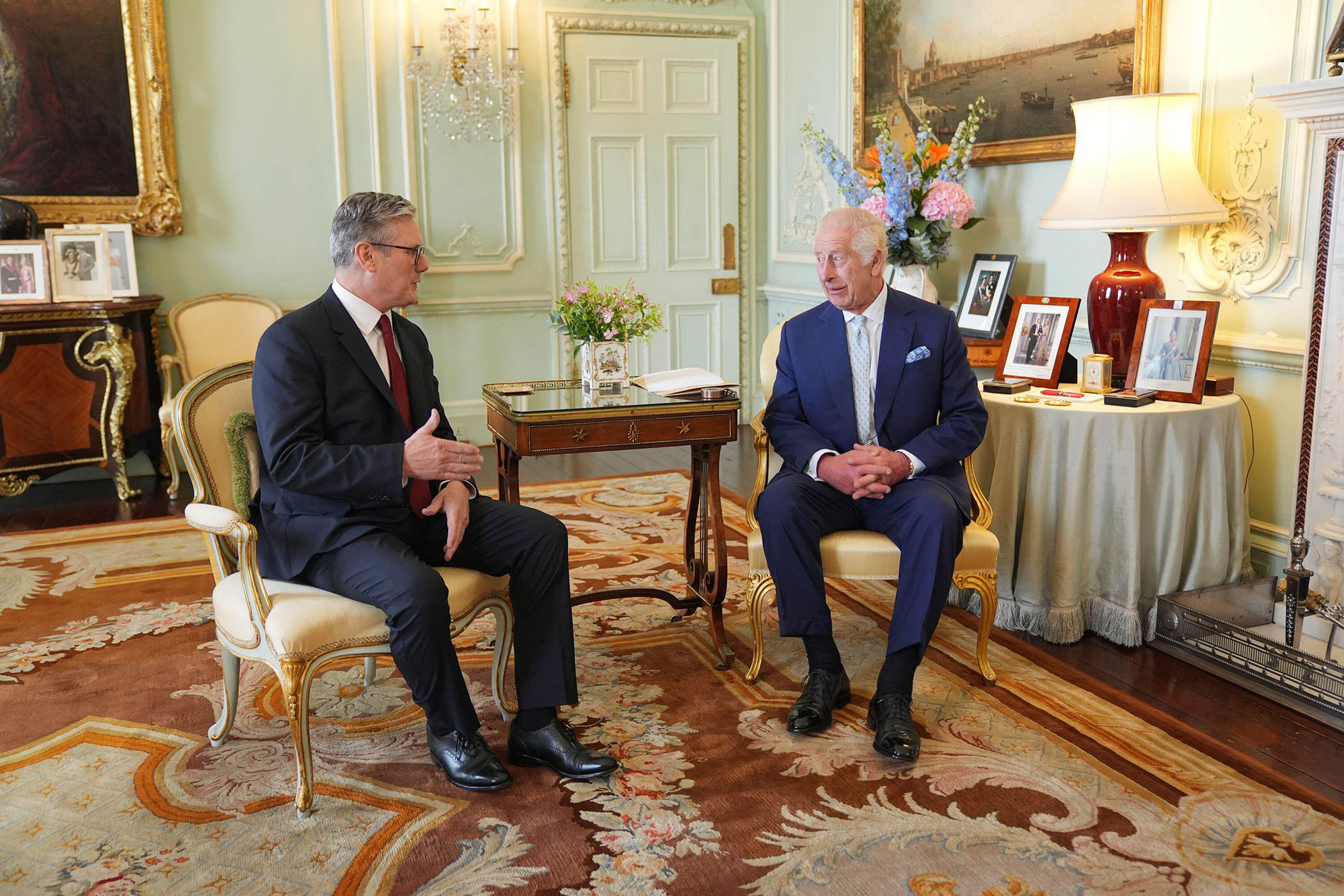Portrait Gary Calton for The Observer
This week, The Observer has launched our all new apps and a new website. Find out more and subscribe here. Read next:
Cancer is very much like the Spanish Inquisition: nobody expects it. And its chief weapons are surprise, fear and ruthless efficiency.
Well, it was certainly a surprise for me. I only went to the GP because I thought I had a particularly bad case of indigestion. We had been to Greece for a short holiday, and everything was fine. A few days after returning, I spent a weekend with severe indigestion – acid reflux, tightness in my chest, heartburn and regurgitating food.
My wife, Claire, observed I had lost weight; well, of course I had. I’d spent far too many beach holidays balancing a book on a belly that spilled over my shorts, so I'd been actively trying to avoid that fate this year.
But that, and the advice of a friend who had suffered similar symptoms and been diagnosed with a hiatus hernia, prompted me to somewhat reluctantly book a GP appointment on the morning of 6 October.
That I was able to book a same-day appointment was a surprise. My previous interactions with the surgery had mainly been when the kids were small and needed to see a doctor, which involved sitting on hold on the phone from 8am and being told all appointments had gone at one minute past.
But now there is an app! And, to my shock, I was offered a range of appointments that very day. If I sound like some kind of wide-eyed ingenu marvelling at modern healthcare, there’s a very good reason for that.
After outlining my symptoms to the GP, he called up my health record. It was a mostly blank page. I have been registered with the practice for almost 25 years. He looked at the screen and then at me and said: “You’ve been to the GP once. In 2016. When you fell off a stepladder and cracked a rib on the side of the bath.”
I shrugged. It was true. I’m 55 and I never get ill – or at least, not ill enough to think of visiting the doctor. And in the end, it was that which saved me.
Or rather, it was my GP who saved me. He told me there were two options: put me on a four-week course of super-strength indigestion tablets and see how the land lay after that, or refer me for an endoscopy. I wasn’t keen on having a camera down my throat, but Dr Google had already indicated this was likely if I did indeed have a hiatus hernia, as I suspected. My GP said: “Given you never come to the doctors, let’s do that, just to cover all bases.”
Nine days later, on a Wednesday, I was lying on my side at Airedale Hospital in West Yorkshire, feeling drowsy from the sedation as the camera was fed down my gullet. Minutes later the doctor conducting the endoscopy sat me up and said, in a matter-of-fact way: “There’s an eight-centimetre lesion on your oesophagus. That’s what’s causing the problems.”
“Great!” I said, having absolutely no idea what he was talking about. Still, a lesion: whatever that was, it sounded like something that could be sorted out easily enough. I was given a cup of tea, and Claire was called in. And then I first met Mark, one of the clinical nursing team.
It was only when he suggested we go to a quiet room to talk that the first, faintest alarm bells started distantly tinkling. I have seen enough Casualty to know that’s not good news. But, still slightly befuddled from the sedation, it still didn’t click, until the word lesion slowly morphed into the word tumour during our conversation.
The chief weapon of surprise had been deployed. The gradual realisation dawned on me. I did not have a hiatus hernia, or an ulcer, or any of the completely non-serious things I was expecting. I had cancer.
I am not a complete stranger to cancer. In September 2016, my dad died – he had a raft of illnesses, but not cancer. However, four months later my mum, while still navigating the raging waters of grief, was diagnosed with myeloma, a cancer of the blood.
She spent a couple of months on chemo, with some later sessions of radiotherapy. The disease, while incurable, was seemingly treatable, and for a long time she went into remission. A couple of months ago her consultant put her back on chemo, which she has been having weekly.
Even in someone so close, cancer always felt a little like an abstract concept. It’s an illness; it’s a word; it's something that people get through, or not
Even in someone so close, cancer always felt a little like an abstract concept. It’s an illness; it’s a word; it's something that people get through, or not
She lives on the other side of the country from me, in Wigan, where I grew up. I’m now in West Yorkshire, and we’re divided by the craggy Pennine spine of the country. I attended the meeting when she was given her diagnosis, and a few appointments since then.
But even in someone so close, cancer always felt a little like an abstract concept. It’s an illness; it’s a word; it's something that people get through, or not. Mum always seemed fine on the surface, over the years digging deep into reserves of resilience few thought it was possible for her to mine.
“She’s doing well,” I’d tell anyone who asked. “Yes, she’s fine! Cracking on!”
I was about to find out, though, that no matter what the external appearances are, people living with cancer might not necessarily be doing fine at all.
On the drive home after my endoscopy, the first mention of cancer was curiously buoyant and upbeat. “We’ll beat this!" we declared. “We’re in safe hands. We’ll get through this.” I called family and friends. “Don’t worry,” I assured everyone. “I’ve got this.”
It was the next morning that cancer engaged the second of its chief weapons: fear. Because, despite the bluff bravado, I suddenly wasn’t exactly sure I or anyone else had got this at all.
The fear arose from uncertainty. Potential outcomes had been outlined: the best-case scenario was that I could do several weeks of chemotherapy followed by major surgery, which would probably take place in early 2026.
Determined that life should go on as normal, that day we took my mother-in-law out for lunch, and in the evening Claire and I went to see Danny Robins’ Uncanny stage show at the Bradford Alhambra.
But that morning an envelope had arrived, a copy of a letter from the hospital to my GP apprising him of the situation. Several tests and scans were to take place over the coming days. The best-case scenario was possible only if the cancer had not spread to any of the surrounding organs, especially the lungs.
If that was the situation, then no surgery would be possible. The recommendation would be for chemotherapy, but with “not curative intent”.
Each word landed like a monolith crashing into the sand. Not. Curative. Intent.
Cancer’s chief weapons, then, are surprise, fear and ruthless efficiency. No one knows for sure how long the tumour has been lodged and growing in my oesophagus. The nature of this particular beast is that it quietly bides its time, sinking its hooks into your soft tissue, expanding and spreading, and you don’t get any symptoms until it’s firmly established itself. It’s almost admirable, the way it stealthily takes hold and doesn’t announce itself until it’s almost too late.
However, ruthless efficiency is also a weapon of the NHS. And, well before I even knew what my diagnosis was, that engine of war against cancer had been fired up and engaged in a way I’d never have thought possible.
In almost 37 years as a journalist, I have probably written countless times about people “bravely battling” cancer. I do not feel I am battling cancer. I don’t think I can fight it. It’s happening, inside me, and there's nothing I can personally do. At best, I feel like a sort of Vichy government in nominal charge of my own body, harbouring this occupier until such time as liberating forces can effect an invasion and return sovereignty to me.
Last week, the BBC published analysis showing that almost all NHS trusts are failing to meet key waiting time targets for cancer care, the main one being that patients should begin treatment within 62 days of an urgent GP referral. Only three – Calderdale and Huddersfield, East and North Hertfordshire and Bolton NHS – are hitting the mark.
I consider myself very lucky indeed. The trust I am under, Airedale, is ranked 13th in the country for hitting these targets. Thanks to the swift action of my GP and the clinical nursing team I was referred to, my chemotherapy began on 17 November, 42 days after I visited my GP with what I thought was nothing more than a bad case of heartburn.
The appointments after my diagnosis came thick and fast. CT scans, Pet scans, oncologist consultations, an exercise test, a meeting with the surgeon who will hopefully be slicing out my oesophagus next year. The scans showed that the cancer apparently hadn't spread. Treatment has begun with, thank God, curative intent.
The chemotherapy and surgery had also been something of an abstract concept, when I was unsure whether it would go ahead. The last couple of weeks or so have seen a flurry of meetings about what exactly this will involve over the coming months.
I’ve had a Picc line put in – 51cm of it from my right arm, through a vein and to my heart –through which the cocktail of drugs that will hopefully shrink and stop the spread of the tumour is delivered.
A consent meeting saw me signing a form to say I understood the risks of treatment, ranging from “feeling a bit tired” to losing my hair to potential death. My immune system will hit the floor during chemo, and even the prospect of a bit of a sniffle haunts me like a looming spectre out to end me.
I suppose it all stopped being abstract when the chemotherapy started, on 17 November. Around eight hours in hospital, hooked up to a parade of intravenous drips. Then one to take home, attached to a pump for 24 hours.
Drip-drip-dripping poison into my veins to attack the tumour and contain any possible spread, but also almost indiscriminately targeting the rest of my body as well. My immunity is hitting the floor and I have a bag of pills and syringes to offset the effects of the treatment.
Chemotherapy is pretty much the nuclear option, waging a scorched-earth policy against my cancer, with fatigue, nausea, hair loss, the heightened risk of infection all deemed collateral damage.
As for the operation, probably in February next year: out with the oesophagus and a section of stomach, which is then hoiked up to be joined to what’s left of my gullet, while my lungs are deflated and my ribs prised open. It’s seven hours or so of a job. And then – after more chemo, no complications and some months’ recovery – I might potentially be back to normal, near as dammit.
“Have you done this before?” I ask the surgeon as he outlines the frankly terrifying details of the operation.
He quickly tots up in his head. “About 75 times,” he smiles.
I stand up and shake his hand. “You’re hired.”
It’s all rather grim. But, as they say, compared to the alternative… Well, in a way it feels like Christmas has come early.
My diagnosis was the last thing anyone expected or needed – but especially my mum, while going through chemotherapy herself. After the initial shock, we settled into our usual phone calls charged with a current of humour. This is the woman who, after all, was thrown out of Macy’s in New York for laughing uncontrollably with my auntie on the department store’s massage chairs.
“My cancer’s worse than yours,” I’ll say. “My chemotherapy is going to be far harder. You didn’t lose your hair.”
“Oh, always got to have it worse, haven’t you?” she’ll laugh. “Give me a bucket of sand and I’ll sing the Desert Song,” or one of her other impenetrable sayings. “Anyway, it’s OK for men to be bald these days. It’s quite fashionable.”
A pox on those who would talk down the NHS, who would underfund it, defund it and even seek to dismantle it
A pox on those who would talk down the NHS, who would underfund it, defund it and even seek to dismantle it
Then we’ll get into the important stuff of who’s dead, who’s ill, whether the Tesco delivery came on time, and why she can’t get her Alexa to connect to the wifi.
Are we doing fine? Maybe we are; maybe we're not, all the time. But what I’ve always felt before – sympathy – has been alloyed with something else now: empathy. I’m beginning to understand what she’s been going through. And now, though separated by distance and neither able to travel much, we can be fine, or not, together – on the phone at least.
“I’ll tell you another thing,” says Mum. “I’ll not have a word said against the NHS. They’ve been absolutely faultless. The people are wonderful. I don’t know how they do what they do.”
If the NHS is deemed to be failing in its targets, it is not the fault of those working within it. I have never seen such efficiency, such empathy, such professionalism, such humanity. I honestly believe nobody I have dealt with could possibly be doing more, not just for me but for all the patients under their care.
A pox on those who would talk down the NHS, who would underfund it, defund it and even seek to dismantle it. A pox on them, and even then they would be treated for it with the unrelenting compassion and competence that I have seen in these, my first real up-close-and-personal dealings with our public health service.
If anyone deems the NHS to be failing, then those failings are the result of external forces. Targets are missed because of the lack of staff, or machinery, or beds. The lack of money. It is, by any metric, an utter disgrace.
My journey has just begun, and nothing is guaranteed. There’s a long, tough road ahead, I’m under no illusions about that. As with the Spanish Inquisition, nobody expects cancer, except for perhaps those at the sharp end of the NHS. And I honestly shudder to think where I might be now without the might and humanity of this wonderful ship and all who sail in her.
Read more by David Barnett in The Observer here.
Newsletters
Choose the newsletters you want to receive
View more
For information about how The Observer protects your data, read our Privacy Policy


